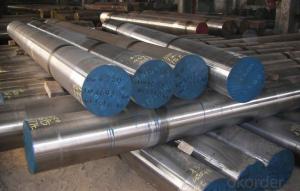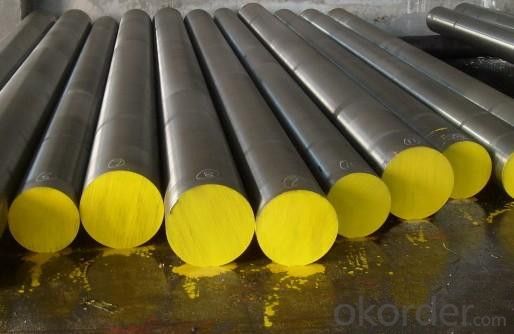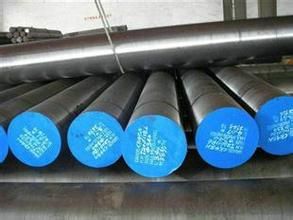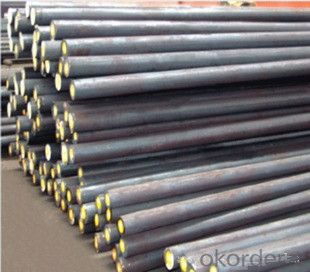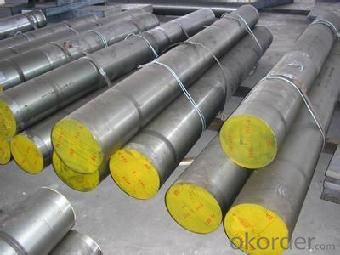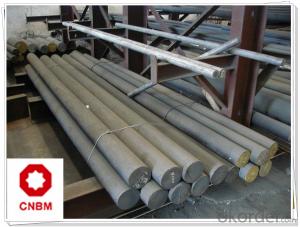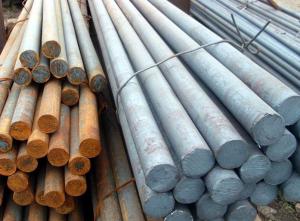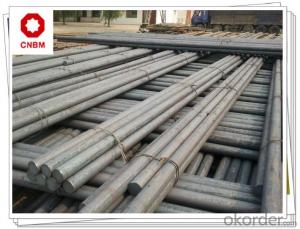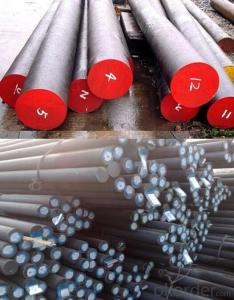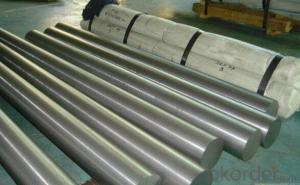Alloy Steel AISI 5120 SCr420H
- Loading Port:
- Shanghai
- Payment Terms:
- TT OR LC
- Min Order Qty:
- 30 m.t.
- Supply Capability:
- 120000 m.t./month
OKorder Service Pledge
OKorder Financial Service
You Might Also Like
AISI 5120 Alloy Steel SCr420H
Specification
1, Diameter: 8mm-250mm rounds
5mm-9mm rods
2, Length: 2m, 3m, 5.8m, 6m or customized
3, Standard: GB, ASTM, AISI, SAE, DIN, JIS, EN
OEM technology - send detailed technical parameters for accurate quotation.
2, Produce Process: smelt iron - EAF smelt billet - ESR smelt billet -
hot rolled or forged to get the steel round bar and plate
3, Heat Treatment: annealing, normalizing, tempering, quenching
4, Surface Treatment: Black, Polished, Galvanized
5, Quality Assurance: We accept third party inspection for all orders.
You can ask testing organizations such as SGS, BV, etc. to test our products before shipping.
Chemical Composition
| C | Si | Mn | Cr | S | P | Ni | Cu |
| 0.18~0.24 | 0.17~0.37 | 0.50~0.80 | 0.70~1.00 | ≤0.035 | ≤0.035 | ≤0.030 | ≤0.030 |
Products Show
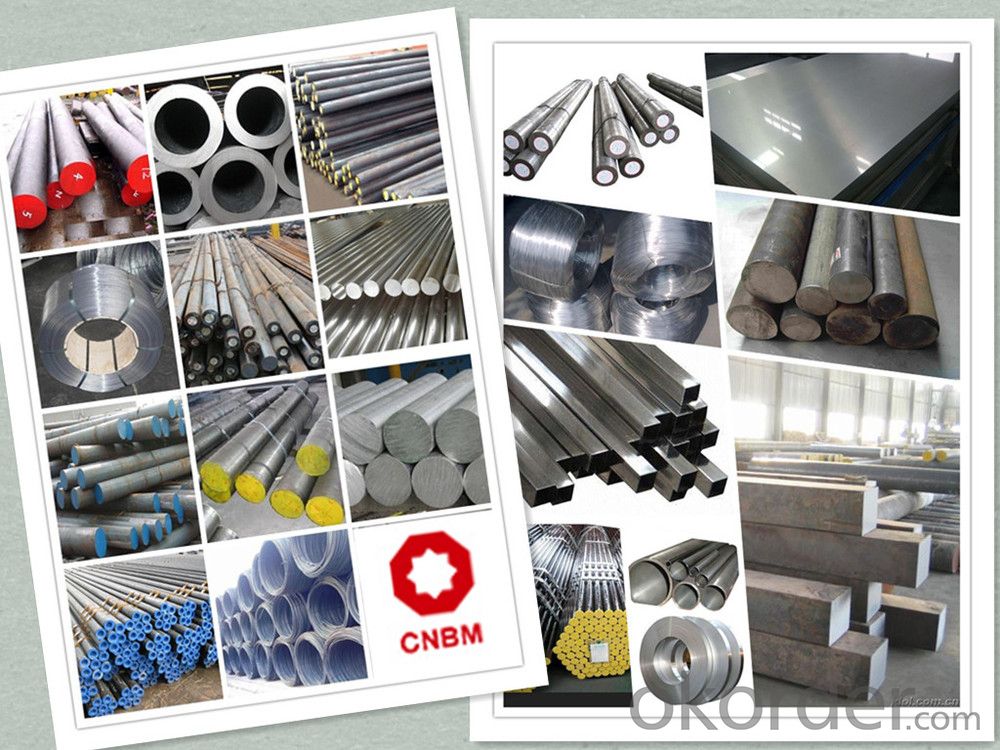
Product Overviews
Description | Carbon Steel Rod/Carbon Steel Bar,carbon steel rod,carbon steel shaft,mild steel bar, Mild steel shaft,ms bar | |
Material | ASTM | 1005, 1006, 1008, 1010, 1015, 1020, 1025, 1030, 1035, 1040, 1045, 1050, 1055, 1060, 1065, 1070, 1080, 1084, 1016, 1022 |
DIN | Ck10, Ck15, Ck22, Ck25, Ck30, Ck35, Ck40,Ck45, Ck50, 30Mn4, 40Mn4 | |
BS | 040A04, 095M15, 045M10, 080A40, 045M10, 080M50 | |
JIS | S09CK, S9CK, S10C, S15C, S20C, S25C, S30C, S35C, S40C, S45C, S50C, S55C, S58C, SB45, S30C, S40C, S45C, S53C | |
Standard | GB/T799, ASTM A29, A108, A321, A575, BS970, DIN1652, JIS G4051 | |
| Section shape | Round, square, hexagonal, flat, angle | |
| Surface | Black painted, galvanized | |
Specifications | Round bar | Diameter: 4mm~1200mm |
Angle bar | Size: 3mm*20mm*20mm~12mm*800mm*800mm | |
Square bar | Size: 4mm*4mm~100mm*100mm | |
Flat bar | Thickness: 2mm~100mm | |
Width: 10mm~500mm | ||
| Hexagonal | Size: 4mm~800mm | |
Length | 2m, 4m, 5.8m, 6m, 11.8m, 12m or as required. | |
Work Shop
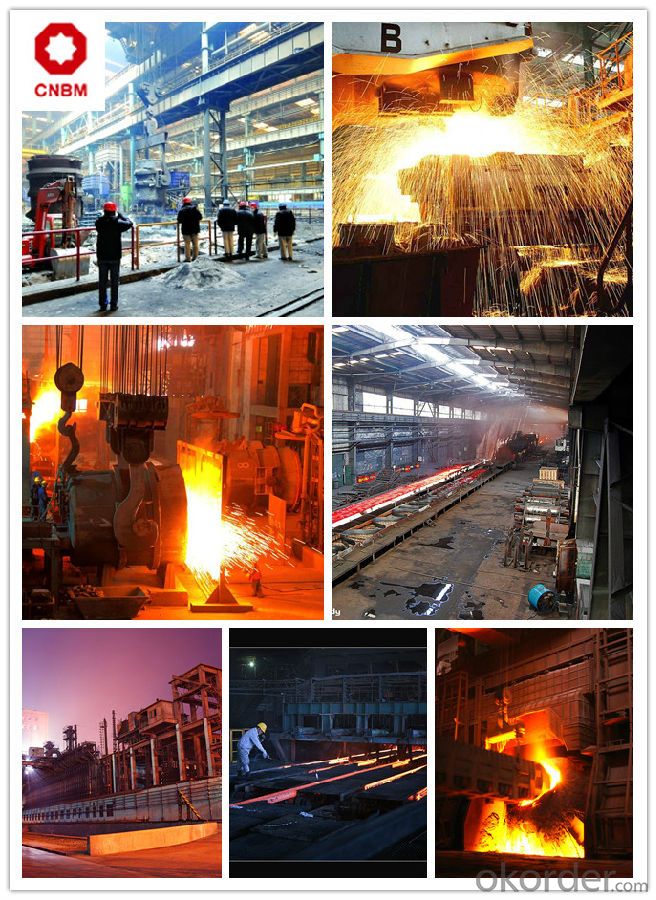
Company Information
CNBM International Corporation is the most important trading platform of CNBM group.
Whith its advantages, CNBM International are mainly concentrate on Cement, Glass, Iron and Steel, Ceramics industries and devotes herself for supplying high qulity series of refractories as well as technical consultancies and logistics solutions.

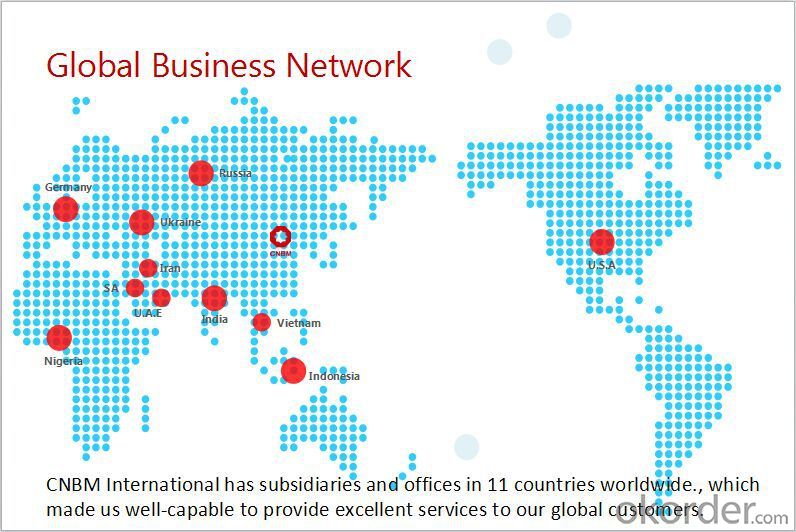
FAQ
1, Your advantages?
professional products inquiry, products knowledge train (for agents), smooth goods delivery, excellent customer solution proposale
2, Test & Certificate?
SGS test is available, customer inspection before shipping is welcome, third party inspection is no problem
3, Factory or Trading Company?
CNBM is a trading company but we have so many protocol factories and CNBM works as a trading department of these factories. Also CNBM is the holding company of many factories.
4, Payment Terms?
30% TT as deposit and 70% before delivery.
Irrevocable L/C at sight.
5, Trading Terms?
EXW, FOB, CIF, FFR, CNF
6, After-sale Service?
CNBM provides the services and support you need for every step of our cooperation. We're the business partner you can trust.
For any problem, please kindly contact us at any your convenient time.
We'll reply you in our first priority within 24 hours.
Packaging & Delivery
1, Packaging: seaworthy package or as required
2, Delivery: 35-45 days or based on quantity
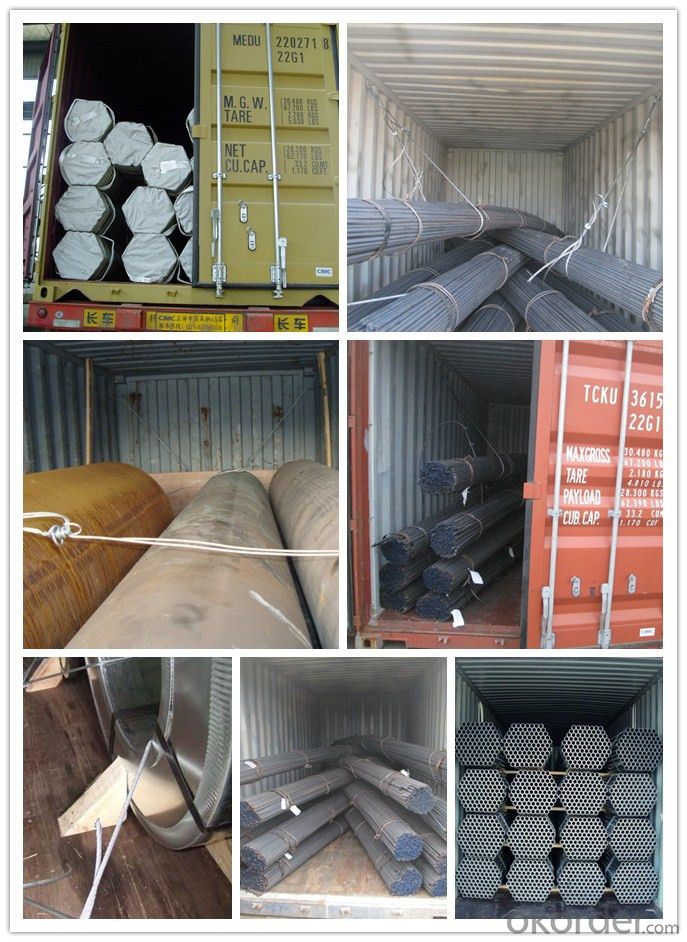
- Q: What are the different types of steel round bar alloys for improved hardness and strength?
- Improved hardness and strength are characteristics associated with various types of steel round bar alloys. Some commonly used alloys renowned for these qualities include: 1. Carbon Steel: Exceptional strength and hardness make carbon steel a popular choice. Its higher carbon content enhances durability and resistance to wear and tear. 2. Alloy Steel: Combining carbon steel with elements like manganese, nickel, chromium, or vanadium results in alloy steel. These additions enhance hardness and strength, making it suitable for applications requiring high tensile strength and toughness. 3. Stainless Steel: With a minimum chromium content of 10.5%, stainless steel is a corrosion-resistant alloy. Chromium's addition improves hardness and strength, making it ideal for applications demanding resistance to corrosion, heat, and wear. 4. Tool Steel: Tool steel is tailor-made for manufacturing various tools. It boasts high hardness, wear resistance, and strength. Elements like tungsten, molybdenum, or vanadium are often added to enhance its performance. 5. High-Speed Steel: Developed specifically for high-speed cutting tools like drills and milling cutters, high-speed steel excels in hardness and retains its cutting edge even at high temperatures. 6. Maraging Steel: Maraging steel, a low-carbon, high-nickel alloy, stands out for its exceptional strength, toughness, and resistance to fatigue. It finds applications in industries like aerospace and defense that demand high strength and durability. These examples merely scratch the surface of the steel round bar alloys known for improved hardness and strength. The choice of alloy depends on the intended application and desired properties for the final product.
- Q: How are steel round bars measured and specified?
- Steel round bars are measured and specified based on their diameter, which is typically expressed in millimeters or inches. The measurement is taken across the widest point of the circular cross-section of the bar. In addition to the diameter, the length of the bar is also specified. The measurements and specifications are crucial in determining the appropriate size and quantity of steel round bars required for a particular application or project.
- Q: Can steel round bars be used in the production of musical instruments?
- Certainly! Musical instruments can indeed be produced using steel round bars. Steel, being a versatile material, possesses a wide array of desirable attributes including strength, durability, and resonance. Although wood is typically the go-to material for crafting musical instruments, steel can be utilized in specific instances to augment the instrument's sound and performance. For instance, steel round bars can be implemented in the fabrication of various components such as keys or valves for wind instruments like saxophones or trumpets. Moreover, these bars can be employed to construct the internal support systems in instruments like guitars or cellos, thereby providing stability and enriching tonal qualities. Furthermore, steel round bars can be employed in the construction of percussion instruments such as steel drums or xylophones, where their robust and resonant attributes are highly sought after. On the whole, although wood remains the more prevalent choice in the realm of musical instrument production, steel can certainly be employed in specific scenarios to attain desired sound characteristics and structural integrity.
- Q: How strong are steel round bars compared to other materials?
- Steel round bars, renowned for their exceptional strength and durability, are widely recognized as one of the toughest materials available. In comparison to aluminum, brass, and wood, steel round bars boast a significantly higher tensile strength, referring to their capacity to withstand pulling forces without succumbing to breakage. Moreover, steel round bars are capable of handling higher compressive loads, rendering them highly suitable for applications involving substantial pressure or heavy loads. Not only do steel round bars exhibit remarkable strength, but they also showcase excellent ductility, allowing for easy shaping and bending without any risk of fracture. This remarkable feature grants steel round bars versatility, which explains their extensive utilization in diverse industries such as construction, automotive, manufacturing, and aerospace. While other materials possess their own distinctive properties and applications, steel round bars consistently remain the preferred choice in terms of strength and reliability. Their ability to endure high loads, resist deformation, and maintain structural integrity positions them as a favored option for structural components, shafts, axles, and various other demanding applications.
- Q: Can steel round bars be used in the aerospace industry?
- Steel round bars have the capacity to be utilized in the aerospace industry. Steel is a versatile substance that finds application in diverse sectors, including aerospace. In the construction of aircraft components and structures, such as landing gears, engine parts, and structural supports, steel round bars are frequently employed. Steel possesses exceptional strength and durability, crucial attributes for guaranteeing aircraft safety and reliability in the aerospace field. Moreover, steel round bars can be customized and manipulated to meet the specific design and performance necessities of aerospace applications. In summary, steel round bars are an appropriate material selection for numerous aerospace applications owing to their mechanical properties, dependability, and cost-effectiveness.
- Q: Can steel round bars be used for making agricultural equipment?
- Yes, steel round bars can be used for making agricultural equipment. Steel round bars are known for their high strength and durability, making them suitable for heavy-duty applications in the agricultural industry. They can be used to manufacture various agricultural equipment such as plows, tillers, cultivators, harrows, and seeders. The strength of steel round bars allows these equipment to withstand the harsh conditions in the field, including the impact of rocks and hard soil. Additionally, steel round bars can be easily shaped and welded, providing flexibility in designing and customizing agricultural equipment according to specific requirements. Overall, steel round bars are a reliable and cost-effective material choice for making agricultural equipment due to their strength, durability, and versatility.
- Q: What are the different types of steel round bar coatings used in the marine industry?
- There are several types of steel round bar coatings commonly used in the marine industry, including galvanized coatings, epoxy coatings, and corrosion-resistant coatings. These coatings help protect the steel from rust and corrosion caused by exposure to saltwater and other harsh marine environments.
- Q: What are the different surface treatments available for carbon steel round bars?
- Carbon steel round bars have various surface treatments available, each serving a specific purpose and offering unique advantages. Some of the most commonly used treatments include: 1. Galvanizing: A layer of zinc is applied to the surface of the carbon steel round bar. This treatment provides exceptional corrosion resistance and significantly prolongs the steel's lifespan. 2. Black oxide coating: Also called blackening, this treatment creates a uniform, dark finish on the surface of the carbon steel round bar. Black oxide coatings offer mild corrosion resistance, improved lubricity, and a decorative appearance. 3. Chromium plating: By depositing a layer of chromium onto the carbon steel round bar's surface, typically through electroplating, this treatment enhances corrosion resistance, wear resistance, and provides a polished appearance. 4. Nitriding: Nitriding is a heat treatment process that diffuses nitrogen into the surface of the carbon steel round bar, resulting in a hard and wear-resistant layer. This treatment improves the steel's hardness and fatigue strength, making it suitable for applications requiring enhanced durability. 5. Phosphating: Phosphating is a chemical treatment that converts the surface of the carbon steel round bar into a layer of phosphate crystals. This treatment offers excellent corrosion resistance and enhances the adhesion of applied coatings or paints. 6. Powder coating: This treatment involves applying a dry powder to the surface of the carbon steel round bar, which is then cured under heat to form a protective coating. Powder coatings provide exceptional corrosion resistance, durability, and can be customized in various colors and finishes. These examples represent only a few of the available surface treatments for carbon steel round bars. The choice of treatment depends on the specific requirements of the application, such as corrosion resistance, wear resistance, aesthetics, and cost-effectiveness.
- Q: Can steel round bars be used in the manufacturing of garden tools?
- Absolutely, garden tools can certainly incorporate steel round bars in their manufacturing process. Steel, known for its versatility and durability, is widely employed in the production of diverse tools, particularly those used in gardens. Shovels, rakes, hoes, and pruning shears are just a few examples of garden implements that can be crafted using steel round bars, thanks to their malleability. The exceptional strength and resilience of steel render it perfectly suited for enduring the strenuous demands of outdoor activities like digging, cutting, and scraping. Moreover, steel can be effortlessly honed and maintained, ensuring that the garden tools retain their efficacy and longevity.
- Q: Can steel round bars be used for making universal joints?
- Yes, steel round bars can be used for making universal joints. Steel round bars are commonly used in the manufacturing of universal joints due to their strength, durability, and ability to handle high torque and rotational forces.
Send your message to us
Alloy Steel AISI 5120 SCr420H
- Loading Port:
- Shanghai
- Payment Terms:
- TT OR LC
- Min Order Qty:
- 30 m.t.
- Supply Capability:
- 120000 m.t./month
OKorder Service Pledge
OKorder Financial Service
Similar products
Hot products
Hot Searches
Related keywords
